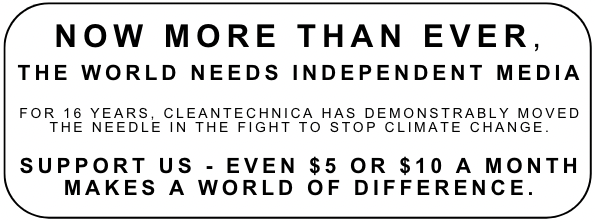
Sign up for daily news updates from CleanTechnica on email. Or follow us on Google News!
Earlier this week, two US Senators blocked a Democrat’s attempt to hold a second term on the National Labor Relations Board (NLRB). In past years, that might not have seemed so serious. However, with once-and-future President Donald J. Trump already holding court from Mar-a-Lago, the Trumpsters’ effect on worker rights is sure to have significant consequences.
Thanks to the Democrats-turned-Independent turncoats sycophants Senator Joe Manchin and Senator Kyrsten Sinema, Lauren McFerran’s bid for a new five-year NLRB term is a non-starter.
“It is deeply disappointing, a direct attack on working people, and incredibly troubling that this highly qualified nominee — with a proven track record of protecting worker rights — did not have the votes,” Senate Majority Leader Chuck Schumer (D-NY) interjected.
Trump’s first term was a series of constant attacks on workers’ rights — in 2020 the Economic Policy Institute chronicled the first Trump administration’s 50 most egregious attacks on working people. Now, it seems as if the NLRB seesaw will usher in more attempts to dismantle worker rights such as the right to organize, to protect workplace health and safety rules, and to assure overtime pay.
The National Labor Relations Board describes itself as an “independent federal agency vested with the power to safeguard employees’ rights to organize and to determine whether to have unions as their bargaining representative.” That independence surely has waned with every Republican senator except Senator Roger Marshall of Kansas voting against McFerran for a new five-year term as head of the Board.
Sara Nelson, president of the Association of Flight Attendants-CWA union, decried the decision to oust McFerran as part of a larger anti-worker agenda.
“The entire GOP has relentlessly fought against anything good for the vast majority of the people of this country. The GOP shows once again their total disdain for their constituents. But they better watch what they do in implementing their plans to make it worse. These laws are set up to mostly protect corporations and getting rid of the last pathetic bits of worker rights under the law will simply lead to more disruption and CHAOS.”
Even with the NLRB shift, the Teamsters hedged their bets and aligned with Trump; their prospects for Trump moving forward now are assured.
The United Auto Workers (UAW), however, is at a crossroads. Trump’s victory in the 2024 election has dealt a significant blow to UAW President Shawn Fain’s efforts to rebuild the union’s political influence. Harris’ defeat raises questions about Fain’s political sway within the membership and the effectiveness of its union’s efforts.
Trump’s re-election is bad news for the UAW due to his anti-union stance, upcoming trade war, and likely resulting volatile geopolitical landscape. The auto industry may find itself upended. With diminished political influence following the return of the Trumpsters, how will the UAW respond?
Trumpsters Rally around Them-that-Brought-‘Em to the White House
It’s not just the UAW that finds itself in a moment of redefining goals for its members. Automakers, suppliers, labor leaders, and analysts are weighing the possible impact of anticipated policy shifts, especially in trade, emissions, and energy costs.
Unions that aligned themselves with the Trumpsters during the election have already found success in negotiations. As the New York Times reports, Trump lent his support on Thursday to the International Longshoremen’s Association (ILA), which represents dockworkers on the East and Gulf Coasts. Contract negotiations between the union and employers have broken down over the use of port machinery that can move cargo without human involvement. Trump’s perceived backing of the ILA suggests he could strengthen the hand of unions that have courted him.
Let’s be honest, though (which is hard in a post-truth society), ILA union compromises with employers will be difficult. The deadlock in talks appears to center on equipment such as “semi-automated” cranes, which lift containers, stack them, and load them onto trucks. A human operator is not involved in the stacking of containers.
It seems instructive that the ILA contract dispute centered around automation. Many other unions and their supporters are concerned about the potential for massive job displacement because AI has the potential to dramatically transform the workforce. Is it inevitable that the future for industry is a series of algorithmic commands that could direct machines to assume much product assembly line work — or even entire industries?
UAW members were divided in their political leanings during the Trump–Harris election for similar reasons — they were concerned with job security due to the transition to electric vehicles. It was a concern that Trump effectively used to his advantage. While it is unrealistic to suggest that the transition to EVs can be stopped, the Trumpsters crafted a message that resonated with autoworkers. Also, there was widespread dissatisfaction with inflation, despite people largely not understanding where it came from or the fact that the US brought inflation down faster than other Western economies.
Despite the loss, Fain remains focused on the union’s broader goals. He has urged members to continue fighting for better working conditions, good union jobs, and fair wages, regardless of who holds the White House. Fain called on a refocus for union jobs, fair trade policies, and the protection of US manufacturing in critical sectors like EV batteries. Fain challenged Washington, calling on lawmakers to support the working class and resist corporate pressures.
Now, with the recent National Labor Relations Board shift in power, the political climate will become even less favorable to union efforts, and the UAW will face additional challenges.
A Populist Message that was Lost in Translation
While the automotive industry’s momentum toward electrification has grown significantly, there is concern that deregulation could reduce incentives and slow EV adoption. Creating green union jobs is fundamental to this awakening.
Senator Bernie Sanders (I-VT) insists that “it should come as no great surprise that a Democratic Party which has abandoned working class people would find that the working class has abandoned them.” How will the UAW undermine the appealing but false narrative of a billionaire president who pushes regressive economic policies?
If the Democratic Party finds itself needing to forge strong populist, people-centered policies and take on corporate power, so, too, does the UAW.
Senator Chris Murphy (D-CT) argues that the progressive sector of the Democratic Party has “never fully grappled with the wreckage of fifty years of neoliberalism” and moving “past the way people are feeling (alone, impotent, overwhelmed) and straight to uninspiring solutions.” How will the UAW turn the Trumpsters’ messaging about pricing and the economy to their favor? Will the UAW be able to convince people they keenly understand the daily struggle to make ends meet? As Aru Shiney-Ajay writes on Common Dreams, “simply being ‘Not Trump’” hasn’t been enough to people who admitted they were struggling to afford groceries and rent, who were anxious about job prospects, and who were grappling with the economic uncertainty that “has made the American Dream feel out of reach.”
Shaking up the status quo means making transparent how important it is to advocate for everyday people. The UAW can forge ahead by finding common ground with groups like the Zero Emission Transportation Association (ZETA) and Electric Drive Transportation Association (EDTA). Those alliances can mean gaining bipartisan support to advance US competition in the global EV market.
That’s only the first step, of course. With billions of dollars already invested in the EV sector, strong, stable US automotive leadership is crucial for the automotive industry. Consumer advocate Ralph Nader wrote after the 2024 Trump win that workers’ rights advocates and others must start immediately on the offensive to counter the upcoming administration’s policies and programs.
“Now is the time to prepare anticipatory strategies against what the vengeful, avaricious, lawless Trump and his Trumpsters have boasted out loud about daily. Don’t wait until Trump’s inauguration. The anticipatory strategies here must be diverse, covering all three branches of government, and vectored toward the GOP. The citizen groups may have to work weekends, alongside the labor unions hated by Trump.”

Chip in a few dollars a month to help support independent cleantech coverage that helps to accelerate the cleantech revolution!
Have a tip for CleanTechnica? Want to advertise? Want to suggest a guest for our CleanTech Talk podcast? Contact us here.
Sign up for our daily newsletter for 15 new cleantech stories a day. Or sign up for our weekly one if daily is too frequent.
CleanTechnica uses affiliate links. See our policy here.
CleanTechnica’s Comment Policy




